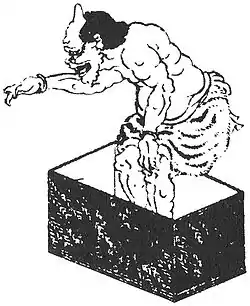天邪鬼
Chinese
| day; sky; heaven | demonical; iniquitous; nefarious | ghost; sly; crafty | ||
|---|---|---|---|---|
| simp. and trad. (天邪鬼) |
天 | 邪 | 鬼 | |
Pronunciation
Japanese

Etymology 1
| Kanji in this term | ||
|---|---|---|
| 天 | 邪 | 鬼 |
| あま(の) Grade: 1 |
じゃ Grade: S |
く Grade: S |
| Irregular | ||
Compound of 天 (ama, “heaven”) + の (no, possessive particle) + 邪鬼 (jaki, “vengeful spirit, cursing kami”).
The jaku reading for the 邪鬼 term is unusual, and the reason for this deviation from the expected jaki reading is unclear. One theory holds that the reading is a shift from 天探女 (ama no sagume), the name of a yōkai that appears in ancient Japanese tales and that seems to have been conflated with the Buddhist jaki, a malevolent demon that leads people astray from the path to enlightenment:[1][2]
- /ama no saɡume/ → /amanozaku/ → /amanod͡ʑaku/
There is a cluster of phonologically similar forms listed in some sources,[1][2] referring either to the Buddhist entity or the yōkai, consistent with the conflation theory:
- /amanod͡ʑaku/, /amanod͡ʑako/, /amanozaku/, /amanozako/, /amanɕaɡume/
The amanojaku reading appears to be the most common reading for the 天邪鬼 spelling.
Pronunciation
Alternative forms
- 天の邪鬼
Noun
天邪鬼 (hiragana あまのじゃく, rōmaji amanojaku)
- a kind of oni that appears in various folktales as the bad guy, who deliberately goes against what people say
- someone with a personality or behavior reminiscent of the folktale character: a crank, a perverse person
- Synonyms: 捻くれ者 (hinekure-mono), 旋毛曲り (tsumuji-magari)
- (Buddhism) in Buddhist statuary, the small devil or demon being trampled under the feet of a 仁王 (Niō, “Deva king”) or one of the 四天王 (Shitennō, “four Deva warriors”)
- (Buddhism) in Buddhist statuary, the devil or demon face on the breastplate of 毘沙門天 (Bishamonten, “Vaiśravaṇa”)
- a grub (insect larva)
- Synonym: 地虫 (jimushi)
Related terms
- 天探女 (amanosagume, “malevolent Shintō entity”)
Etymology 2
| Kanji in this term | ||
|---|---|---|
| 天 | 邪 | 鬼 |
| あま(ん) Grade: 1 |
じゃ Grade: S |
く Grade: S |
| Irregular | ||
Sound shift from amanojaku above, contracting the の (no) to just ん (n).
Pronunciation
Alternative forms
- 天ん邪鬼
Noun
天邪鬼 (hiragana あまんじゃく, rōmaji amanjaku)
- see amanojaku above
Etymology 3
| Kanji in this term | ||
|---|---|---|
| 天 | 邪 | 鬼 |
| あま(の) Grade: 1 |
じゃ Grade: S |
こ Grade: S |
| Irregular | ||
Appears to be a sound shift from amanojaku above.
Alternative forms
- 天の邪鬼
Noun
天邪鬼 (hiragana あまのじゃこ, rōmaji amanojako)
- see amanojaku above
Etymology 4
| Kanji in this term | ||
|---|---|---|
| 天 | 邪 | 鬼 |
| あま(ん) Grade: 1 |
じゃ Grade: S |
こ Grade: S |
| Irregular | ||
Sound shift from amanojako above, contracting the の (no) to just ん (n).
Alternative forms
- 天ん邪鬼
Noun
天邪鬼 (hiragana あまんじゃこ, rōmaji amanjako)
- see amanojaku above
Etymology 5
| Kanji in this term | ||
|---|---|---|
| 天 | 邪 | 鬼 |
| あま(の) Grade: 1 |
ざ Grade: S |
こ Grade: S |
| Irregular | ||
Appears to be a sound shift from amanojako above. Alternatively, may be a separate shift from amanosagume:
- /ama no saɡume/ → /amanozaku/ → /amanozako/
Listed with this reading as Amanozaco in the 1603 edition of the Nippo Jisho.[6]
Alternative forms
- 天邪古
Noun
天邪鬼 (hiragana あまのざこ, rōmaji amanozako)
- see amanojaku above
References
- 1988, 国語大辞典(新装版) (Kokugo Dai Jiten, Revised Edition) (in Japanese), Tōkyō: Shogakukan
- 1995, 大辞泉 (Daijisen) (in Japanese), Tōkyō: Shogakukan, →ISBN
- 2006, 大辞林 (Daijirin), Third Edition (in Japanese), Tōkyō: Sanseidō, →ISBN
- 1998, NHK日本語発音アクセント辞典 (NHK Japanese Pronunciation Accent Dictionary) (in Japanese), Tōkyō: NHK, →ISBN
- 1997, 新明解国語辞典 (Shin Meikai Kokugo Jiten), Fifth Edition (in Japanese), Tōkyō: Sanseidō, →ISBN
- 1603, 日葡辞書: パリ本 / Vocabulario da Lingoa Iapam (Nippo Jisho: Paris edition / Vocabulary of the Language of Japan) (in Japanese and Portuguese), 1976 reprint, Tōkyō: Bensei Publishing, text here at the top of the left-hand column